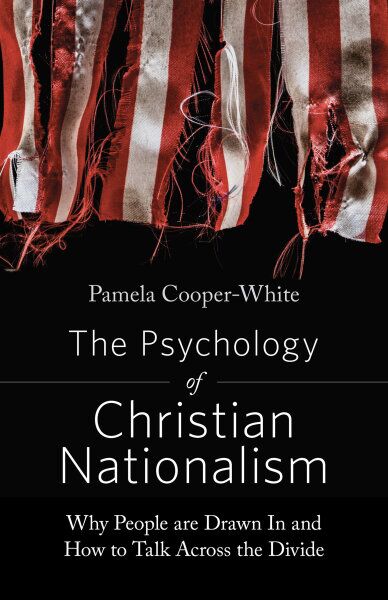In this book, the author investigates how self-identifying Christians, followers of Jesus’ message of peace and compassion, can follow a nationalist movement that is inherently violent and racist.
Using her knowledge of political psychology and an understanding of the history of Christianity and evangelism in the US, Pamela Cooper-White tackles this wide-ranging, complex topic with the purpose of outlining the possibilities for change.
Christian Nationalism is defined by researchers Whitehead and Perry, quoted here, as a ‘cultural framework’. Its purpose is to embed Christianity into every aspect of civic life in the US.
Christian Nationalism upholds the traditional, patriarchal family, white supremacy, and nativism – meaning the superiority of those born in the US over immigrant groups.
At the same time, it spreads fear of what it calls ‘sinful’ influences such as socialism, atheism, women’s rights, Critical Race Theory and LGBT rights.
The same researchers found that over half of all people in the US agreed with or leant towards Christian Nationalist statements.
The book opens with the events of 6 January 2021, when extreme right-wing groups, some of them Christian, stormed congress in Washington DC.
The author links this event to a brand of theology called ‘Dominionism’, popular in the ’70s, that promoted the view that Christians are compelled by God to take over the government of the US.
Many people turn to church groups looking for a feeling of belonging, purpose or security in a confusing world. Evangelical church groups, including ‘mega-churches’, use expert ways of welcoming new members: from cosy chats to follow-up calls to televangelism and specially-produced merchandise.
Church leaders, seeking wealth and power, welcome right-wing politicians, who in turn hope to increase their votes.
There are plenty of vulnerabilities within the movement, such as a fondness for conspiracy theories. And there are also contradictions, as in the role of women leaders, which offer hope.
Many established churches, including black churches, warn against dangerous ideologies.
In the end, the author argues that there is hope for US citizens to hold the ‘good and evil’ in US history together and to work together towards a better future.
Pamela Cooper-White outlines ways to talk to someone who holds views opposed to your own, views which might be ‘truly reprehensible’. She advocates using a ‘traffic light’ system to help you decide when to listen, when to find opportunities for discussion, and when to walk away. She offers invaluable advice and techniques that are applicable for any difficult conversation.


